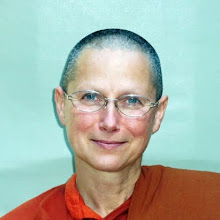>> “There are these ten things that a person gone-forth should reflect on often. Which ten?”
'I have become casteless': a person gone forth should often reflect on this.
'My life is dependent on others'...
'My behavior should be different [from that of householders]'...
'Can I fault myself with regard to my virtue?'...
'Can my knowledgeable fellows in the holy life, on close examination, fault me with regard to my virtue?'...
'I will grow different, separate from all that is dear & appealing to me'...
'I am the owner of my actions (kamma), heir to my actions, born of my actions, related through my actions, and have my actions as my arbitrator. Whatever I do, for good or for evil, to that will I fall heir'...
'What am I becoming as the days & nights fly past?'...
'Do I delight in an empty dwelling?'...
'Have I attained a superior human attainment, a truly noble distinction of knowledge & vision, such that -- when my fellows in the holy life question me in the last days of my life -- I won't feel abashed?': a person gone forth should often reflect on this.
These are the ten things that a person gone-forth should reflect on often.
The conditions here could almost be called perfect. The Ajaan has enough support, devoted Thai people with faith, ready to help him in every situation.
As monastics we live in dependence from laypeople who, out of faith, are willing to support us. In Thailand I was well enough supported from the monastery.
Here I have a room and more than enough to eat and twice I was asked if I need anything. Nothing to complain about, really not .
The Ajaan has his business, running the course, planning the center and has enough people to help him. Which gives me time to reflect on arising feelings of being useless, not helpful, not wanted, feeble and vulnerable, … depending. If Ajaan would not be here, I would probably not be able to go on alms round and I doubt that I would get anything to eat.
It is, in a way, good that he lets me on my own, or does not treat me different from the others, otherwise they would, as happened before, become jealous. They would support me because of him, without ever finding out by themselves if they have faith enough in me to support me. Three of the women at least have that faith.
I do not to get involved with the monks. All I do is smile friendly and greet with palms together. One seeks the conversation and calls me friend, one greets back with palms together and the two young monks who go on alms round with us show some hidden signs of respect when we meet. By and large it is better not to have more contact with them.
So where is the problem, why does fear and insecurity arise?
Last night I dreamt of “my dog”. It had come with me and other people into a big building with many levels like a labyrinth, we were seeking the exit. We finally found one. Out I noticed that the dog wasn’t with me so I run back half the way we came, when I heard it howling and screaming, when it saw me it came running and with me it freaked out of joy and peed of fear. I woke up sweating.
The prospect to ordain soon frightens. Do I feel uncomfortable being dependent from monks and laypeople in a country where giving donation to a reclusive is uncommon? YES! How much more will I feel so when ordained as Bhikkhuni? Now it’s a game to keep the 311 rules and when I fail I can say “oh, doesn’t matter so much, I’m only Mae Chii”. But when I’m ordained it does matter and the circumstances will not be different from now, they will be as life is, uncertain, subject to impermanence.
The Ajahn in Thailand asked me once “are you ready to die”. No, I am not.
Subscribe to:
Post Comments (Atom)


1 comment:
Hi Ayya,
Hang in there! You are doing a great service to the Dhamma as a nun and with this blog! Buddhism needs more women like you who can show that the Buddha's teachings do include women monastics. Thanks for your work with the Dhamma.
metta,
David
Post a Comment